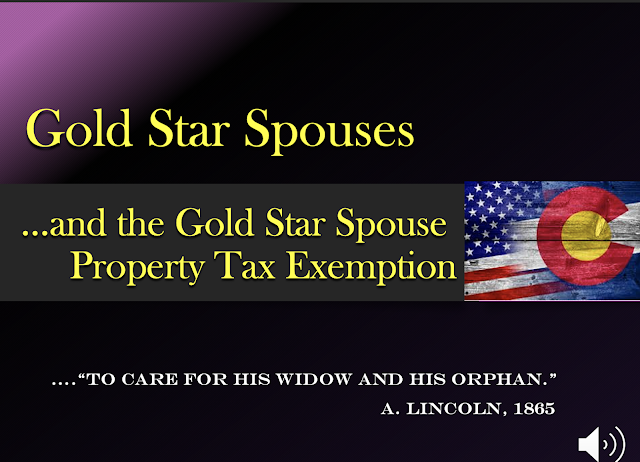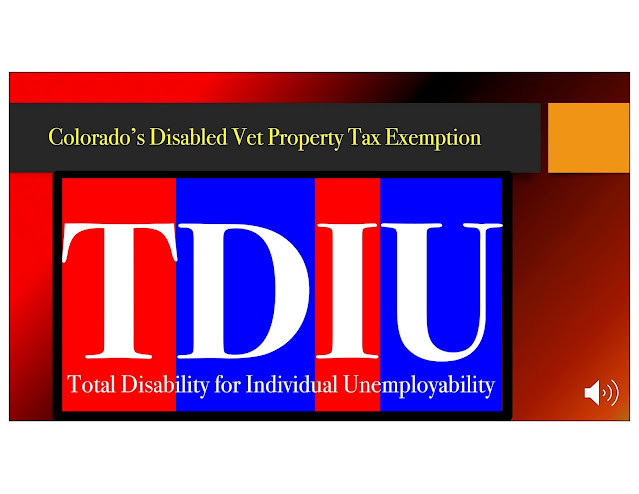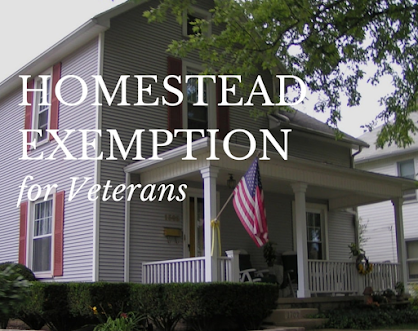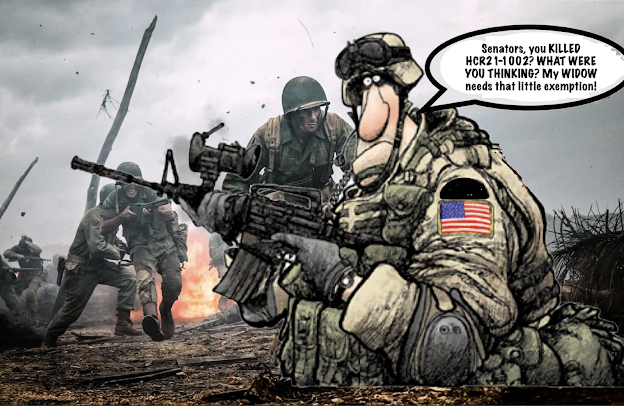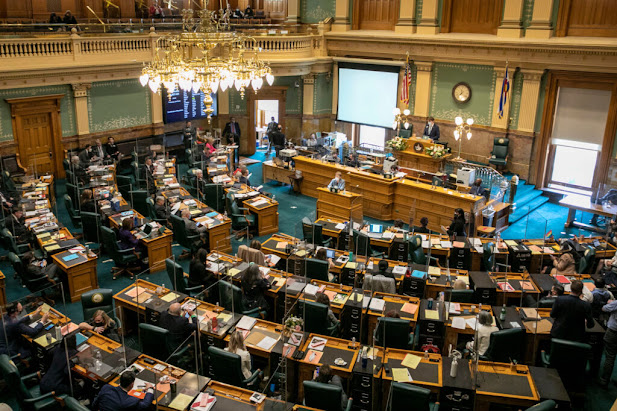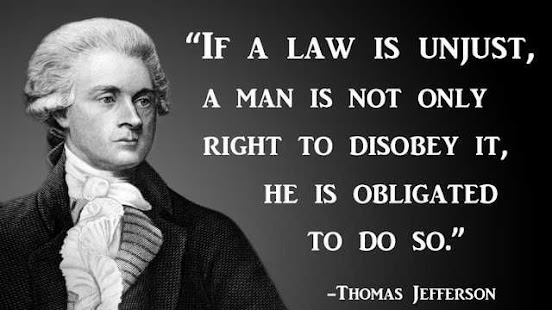Here's a PowerPoint briefing on Colorado's Gold Star Spouses and our effort to qualify them for the state Disabled Veterans Survivor Property Tax Exemption. During the last session of the legislature, the House unanimously approved this but it died in the State Affairs Committee immediately on reaching the Senate.

Colorado recognizes sacrifices of our totally disabled veterans, awarding a partial property tax exemption to 100 percent totally and permanently disabled veterans. The U.S. Department of Veterans Affairs has two types of 100% disabled veterans – (1) vets with a 100% disability (2) vets with a total disability rated “Total Disability for Individual Unemployability” (TDIU.) VA benefits for the two types are identical, but Colorado’s TDIU veterans are unfairly denied the exemption
Sunday, September 12, 2021
Saturday, September 4, 2021
YouTube Video added to explain TDIU & Colorado's Disabled Vet Property Tax Exemption
Here's a PowerPoint briefing on Colorado's TDIU veterans ("total disability for individual unemployability.") Our effort is to qualify these 4800 totally disabled veterans for the same disabled veteran property tax exemption offered other Colorado veterans with a VA 100% rating.
TDIU and 100% are the only two ways VA categorizes a vet as totally and permanently disabled, but Colorado does not permit TDIU vets the small property tax exemption.
Friday, August 20, 2021
COLORADO LEGISLATURE & GOVERNMENT: "TDIU VETS ARE ON THEIR OWN"
Colorado voters approved Referendum E in 2006, not knowing that the legislature had already defined "qualified veteran" so as to exclude vets with the VA "total disability for individual unemployability," (TDIU.)
Colorado's legislators and government officials chose to interpret the requirement for the "VA 100% rating" so as to exclude totally and permanently disabled veterans who are compensated at the 100% level...because they are in fact totally and permanently disabled. The only difference being,
TDIU veterans have a totally disabling injury, worse than standard VA tables are meant to recognize, that is in fact totally and permanently disabling. These are the same totally and permanently disabled veterans – one honored by Colorado with a small property tax exemption and the other totally ignored. Are they less somehow than worthy in the eyes of our mostly non-veteran legislators?
Actually, to be completely correct, TDIU vets haven't been truly ignored. That's because the only attention given TDIU veterans byColorado's legislature and government has been opposition to extending to these vets, totally and permanently disabled in the line of duty, the small property tax exemption.
That's the extent of their efforts. Less than zero, because it was years of "absolutely not" instead of "let's find a way." That has meant years of being denied the specific constitutional benefit voters were told we approved as Article X Section 3.5 for all of Colorado's veterans with honorable service who became permanently and totally disabled in the line of duty.
Have we abandoned thousands of Colorado's TDIU veterans?
Wednesday, August 18, 2021
How Colorado (mis)treats thousands of our totally and permanently disabled veterans - refuses TDIU vets Colorado's disabled veteran property tax exemption
Colorado extends its small, partial property tax exemption only to veterans with the VA 100% disability rating, but REFUSES the exemption to every totally and permanently disabled veterans with the VA "total disability for permanent unemployability" (TDIU) rating. Same total disability in the line of duty, but TDIU vets have injuries that are WORSE than standard tables.
Saturday, August 14, 2021
The legislature hid their cards from us with Referendum E in 2006
In 2006 the legislature referred an issue to the public for a small property tax
exemption for totally and permanently disabled veterans. This was done via SCR06-001. But the legislature hid some of their cards, not telling us all the details, so what we approved was not what we got!
This issue reached the voters as Referendum E in 2006 and was then overwhelmingly approved. Colorado voters believe in protecting our disabled veterans with such important benefits!
The legislature then created "enabling legislation" in the form of HB07-1251 to set into our statutes the provisions of the newly-approved Referendum E.
That sums up the trouble we now have in our state's small disabled veteran property tax exemption.
You see, we were asked to vote on a straightforward text the legislature gave us in the Blue Book:
"AN AMENDMENT TO SECTION 3.5 OF ARTICLE X OF THE CONSTITUTION OF THE STATE OF COLORADO, CONCERNING THE EXTENSION OF THE EXISTING PROPERTY TAX EXEMPTION FOR QUALIFYING SENIORS TO ANY UNITED STATES MILITARY VETERAN WHO IS ONE HUNDRED PERCENT PERMANENTLY DISABLED DUE TO A SERVICE-CONNECTED DISABILITY."
We didn't see the cards the legislature hid behind up their sleeves (or is it behind their backs?) They didn't show us anywhere in the Blue Book that SCR06-001 also had a description of the qualified disabled veteran that, in effect, eliminated almost half of Colorado's veterans who'd been totally and permanently disabled in the line of duty. They didn't tell us anything about their description in what we approved, but they certainly put their hidden cards into Article X Section 3.5 and the enabling statute HB07-1251:
(1.5) For purposes of this section, "disabled veteran" means an individual who has served on active duty in the United States armed forces, including a member of the Colorado national guard who has been ordered into the active military service of the United States, has been separated therefrom under honorable conditions, and has established a service-connected disability that has been rated by the federal department of veterans affairs as one hundred percent permanent disability through disability retirement benefits or a pension pursuant to a law or regulation administered by the department, the department of homeland security, or the department of the army, navy, or air force
The words in highlighted yellow cut thousands of Colorado's totally and permanently disabled veterans, injured in the line of duty and with honorable service, from the property tax exemption we thought we approved for them. We never saw and we never approved those words or anything like them!
The VA has two types of disability ratings for veterans who are totally and permanently disabled in the line of duty. One is called "100% rated" and the other is "Total Disability for Individual Unemployability," or TDIU.
Both ratings are based on the fundamental concept in the VA for compensation based the degree of an injury's impact on the veteran's ability to earn a wage after service:
• The "100% rated" is based on standard tables for the average earning loss caused by the average injury.
• "TDIU" is based on the actual earning loss caused by a worse-than average injury. A TDIU veteran has been individually assessed by VA as having an especially worse-than-average injury rendering him/her actually unable to ever work again.
Colorado's voters thought we were voting for, as the Blue Book put it for us to better understand:
"Veterans are rated 100-percent permanently disabled when a mental or physical injury makes it impossible for the average person to hold a job and the disability is lifelong"
Colorado's legislators and administrators would have us accept that 100% is not the same as total. That the amendment and the statute exclude TDIU veterans with total and permanent disabilities but accept 100% veterans with total and permanent disabilities.
Folks, the legislature simply hid their cards....or did they have them up their sleeves?
We didn't get what we voted for. We didn't protect all the veterans we thought we were protecting with Referendum E!
Friday, August 13, 2021
Colorado says thousands of our vets (TOTALLY & PERMANENTLY DISABLED IN THE LINE OF DUTY) aren't our right kind of vets (TOTALLY & PERMANENTLY DISABLED IN THE LINE OF DUTY) to deserve benefits
The official's correspondence and expertise was very kindly offered to me and I appreciate it, but he just didn't address my point and instead stressed, the law is what the law is, and for changes visit your legislator. He wrote, "In Colorado, the factors that affect the determination as to whether a veteran is a "qualifying disabled veteran" who is eligible for the property exemption are:
"(1) the eligibility requirements set forth in the Colorado Constitution; and (2) Most significantly for the purposes of this response, the purpose for which the federal government has determined a veteran to be "totally" disabled."
I do understand. I'm not the official's client but the state government is his actual client so he steps forth in support, despite the oath of office to the national and state constitutions that one must take for public service. I tried to make the point that I agree with his second point, that "total disability for individual unemployability" (TDIU) is a VA classification for....totally and permanently disabled Colorado veterans injured in the line of duty. My point was that total and 100% are the same words, and we follow the "plain meaning" of words in our state.
Here is what the people of Colorado were told we voted for when we read the text of the referendum in the 2006 Blue Book:
"AN AMENDMENT TO SECTION 3.5 OF ARTICLE X OF THE CONSTITUTION OF THE STATE OF COLORADO, CONCERNING THE EXTENSION OF THE EXISTING PROPERTY TAX EXEMPTION FOR QUALIFYING SENIORS TO ANY UNITED STATES MILITARY VETERAN WHO IS ONE HUNDRED PERCENT PERMANENTLY DISABLED DUE TO A SERVICE-CONNECTED DISABILITY."
I've made the point already that "one-hundred-percent" and "total" as in TDIU mean the same; voters made no distinction and weren't asked to do so...we approved 100% which is the same as total. However, here's the version of what we ended up as Article X Section 3.5 of the constitution once administrators and legislators reworded what they sent us to vote on and what we voted for into what they wanted for us. We got the text of the referendum, but the legislature had in SCR 06-001 their very restrictive definition of a "qualified veteran" that we voters didn't get to see:
(1.5) For purposes of this section, "disabled veteran" means an individual who has served on active duty in the United States armed forces, including a member of the Colorado national guard who has been ordered into the active military service of the United States, has been separated therefrom under honorable conditions, and has established a service-connected disability that has been rated by the federal department of veterans affairs as one hundred percent permanent disability through disability retirement benefits or a pension pursuant to a law or regulation administered by the department, the department of homeland security, or the department of the army, navy, or air force.
We didn't get to see the part highlighted in yellow although it was in SCR06-001 and it also ended up in the constitution as Article X Section 3.5. We do know that the legislature wasn't all that concerned about its own wording because when they did the enabling statute for the referendum once it was approved they decided, without regard for the constitution they'd just given to us to approve, that they'd leave out the text highlighted in yellow.
"(3.5) ‘Qualifying disabled veteran’ means an individual who has served on active duty in the United States armed forces, including a member of the Colorado National Guard who has been ordered into the active military service of the United States, has been separated therefrom under honorable conditions, and has established a service-connected disability that has been rated by the United States department of veterans affairs as one hundred percent permanent and total disability pursuant to a law or regulation administered by the department.
That's right. HB07-1251, the statute the legislature passed didn't have the part about totally disabled military retirees, so for the next fifteen years Colorado taxed these veterans, despite their constitutional entitlement to the property tax exemption:
I spotted the problem in 2014 and worked with my state senator to fix it. In May 2016 the legislature passed HB16-1444 to put those constitutional words protecting totally and permanently disabled military retires back into the statute, but Colorado has ever since ignored that law by simply not providing any form with which those qualified veterans can apply. No form = no exemption, despite the nagging minor detail of these veterans having the benefit enshrined in our hallowed constitution. I refer back to the oaths these folks take upon assuming office to support the state constitution...but it seems not of any importance if things like this aren't of interest to them.
Saturday, July 3, 2021
State Homestead Exemptions - Seventeen states offer 100% disabled Vets a 100% property tax exemption
State Homestead Exemptions – These states are leaders in being especially "veteran friendly." They offer 100% disabled veterans a total personal property tax exemption. In most cases, the exemption carries on to the survivor as well.
By contract, Colorado permits a meager exemption of just half of the first $100,000 in assessed value, saving the veteran about $600.
While insisting Colorado is "veteran-friendly," we then deny the small exemption to Gold Star Widows and to nearly 40% of the state's totally disabled military retirees (TDIU, separated from their service for career-ending line-of-duty injuries.
- #1. ALABAMA
- #2. ARKANSAS
- #3. FLORIDA
- #4. HAWAII
- #5. ILLINOIS
- #6. IOWA
- #7. MARYLAND
- #8. MICHIGAN
- #9. NEBRASKA
- #10. NEW HAMPSHIRE
- #11. NEW JERSEY
- #12. NEW MEXICO
- #13. OKLAHOMA
- #14. PENNSYLVANIA
- #15. SOUTH CAROLINA
- #16. TEXAS
- #17. VIRGINIA
Monday, June 28, 2021
Text of American Legion resolution supporting Gold Star Wives property tax exemption
WHEREAS, on April 5, 2021 the Seventy-third General Assembly of the State of Colorado issued Senate Joint Resolution 21-010, resolving on behalf of the citizens “That we, the members of the Colorado General Assembly, honor the pride and the pain of the parents and partners and children and siblings of our fallen heroes who lost his or her life serving our country and protecting our freedom; and recognize the families of these proud patriots with an expression of profound gratitude and respect” and
Saturday, June 26, 2021
June 26: American Legion Votes Support of Gold Star Wives Property Tax Exemption
The resolution initiated with the Legion post in Fort Collins.
The Legion's resolution urges UVC to include the issue in its 2022 state legislative agenda. The coalition's agenda is yet be finalized. Obviously the legislature itself must agree to a solution during the next session.
Left unclear is whether a constitutional amendment or an act of the legislature will be the preferred approach.
The Legion's approved resolution joins that of the Military and Veterans Affairs Committee of the Colorado Bar Association, plus our own from the C-123 Veterans Association. It remains for the Gold Star Wives, not third parties, to actually initiate UVC consideration of this issue.
(click: resolution of American Legion Department of Colorado)
Thursday, June 24, 2021
Colorado Legislature Wraps Up, Gets Set for 2022
All hope for Gold Star Wives' property tax exemption rose suddenly during the last few days of the 2021 legislative session...and were shot down even faster! The House passed HB21-1002 unanimously but the Senate Veterans and Military Affairs Committee destroyed hopes for this legislation with just a few minutes conversation among the Democrats. Party line vote: Dems=NO, GOP-YES, but the measure failed with Dems in the majority.
| Oh, dear. I'm afraid we're back to the old drawing board. |
Tuesday, June 15, 2021
Monday, June 14, 2021
Colorado Voters Have a Long Memory - especially about how veterans and their survivors are treated
I believe Colorado's Democrat legislators have initiated the more important advances in veterans' benefits, but it would be wrong to conclude that either party is truly disinterested or uncaring. Democrats controlled the House and Senate in 2006 under a Republican governor and are together credited with getting Referendum E in front of the voters. There, the constitutional amendment found overwhelming support. This established the Disabled Veterans Property Tax Exemption in 2007 and reflected well on both parties.
Saturday, June 12, 2021
COLORADO SENATE PRIORITIES FOR 2021 AND 2022
Genuine thanks are due the Colorado House of Representatives!
I must set aside my disappointment with the Colorado Senate Veterans Committee killing HCR21-1001 last week. The House is due a salute and my most sincere thanks for their amazing step of a unanimous vote approving HCR21-1001.
Thank you, Republicans and Democrats in the Colorado House of Representatives for your unanimous approval of HCR21-1002 that you forwarded to the Senate where others decided $93,000 was just too much to "honor" survivors of our servicemembers."...submitting to the registered electors of the state of Colorado an amendment to the Colorado constitution concerning the extension of the property tax exemption for qualifying seniors and disabled veterans to the Gold Star Spouses of deceased members of the United States Armed Forces. "
Wednesday, June 9, 2021
THE REST OF THE STORY: The Brief Life & Sudden Death of Colorado's Gold Star Wives' Tax Exemption
Not about to waste a perfectly good opportunity to turn virtually every veterans' wrath against them, yesterday the Colorado Senate Veterans Committee killed HCR21-1002.
Ever budget-conscious, the committee's discussion indicated they felt it terribly unwise to "waste" $94,000 permitting widows of active-duty troops the same very modest property tax break now given widows of our 100% disabled veterans. Colorado has 140 widows of active-duty troops, all denied the small exemption because the awkward wording of the 2014 legislation restricted the exemption to widows of a veteran already getting the exemption.
Get it?
a) Die on active duty = no widow's tax exemption, or
b) Die after active duty as a disabled vet = widow gets exemption.
Troops call this kind of situation "bass-ack-wards."
The rest of the story? After a unanimous House vote for HCR21-1002, it was killed because some senators might to do "something" next year to go to the voters in 2023 for some relief for the widows in 2024.
"Something" apparently being a larger overhaul of the entire property tax exemption issue that costs $150,000,000 each year. Gold Star Wives (mostly elderly of World War II, Korean Conflict and Vietnam eras) would have added 0.00062 to that $150M.
I think the House could have chosen a better approach to the Gold Star Wives, something easier than the constitutional amendment HCR21-1002 required. The legislature took it on themselves to include widows of 100% disabled vets who were receiving the exemption by HB14-1373, not an amendment which is more difficult.
All the House had to do was use 21 new words refine the definition of "qualifying veteran" to include "or a member of the Armed Forces of the United States who died in the line of duty on active service" in a new statute.
Here's what it took to include survivors in the original 2014 bill:
39-3-203. Property tax exemption - qualifications. (1.5) (a.5)
FOR PROPERTY TAX YEARS COMMENCING ON OR AFTER JANUARY 1, 2015, FIFTY PERCENT OF THE FIRST TWO HUNDRED THOUSAND DOLLARS OF ACTUAL VALUE OF RESIDENTIAL REAL PROPERTY THAT AS OF THE ASSESSMENT DATE IS OWNER-OCCUPIED AND IS USED AS THE PRIMARY RESIDENCE OF AN OWNER-OCCUPIER WHO IS THE SURVIVING SPOUSE OF A QUALIFYING DISABLED VETERAN WHO PREVIOUSLY RECEIVED AN EXEMPTION UNDER PARAGRAPH (a) OF THIS SUBSECTION (1.5) IS EXEMPT FROM TAXATION.
Here's the redefined "qualifying veteran":
SURVIVING SPOUSE OF A QUALIFYING DISABLED VETERAN WHO PREVIOUSLY RECEIVED AN EXEMPTION or a member of the Armed Forces of the United States who died in the line of duty on active service UNDER PARAGRAPH (a) OF THIS SUBSECTION (1.5) IS EXEMPT FROM TAXATION.
And that's "the rest of the story!"
Here's the Colorado Bar Association's statement:
"Gold Star Wives, survivors of active-duty servicemembers, are denied the exemption because the state constitution (Amendment X Section 3.5) allows the exemption to survivors of veterans already in receipt of the benefit. Colorado legislators apparently did not consider the issue of active-duty deaths. Loss of the servicemember on active duty precludes the 'already in receipt of the benefit' requirement. Proposed is a redefinition of a qualified recipient to include survivors of active duty servicemembers who die in the line of duty."
Monday, June 7, 2021
Colorado Bar Association: Statement of Support for Disabled Veterans and Gold Star Wives re: Property Tax Exemption
Saturday, June 5, 2021
We ALL must start reading the Colorado state constitution
Wednesday, June 2, 2021
Did Colorado OVERTAX 100% Disabled Veterans an EXTRA $3.6M in Property Taxes?
In 2007 voters approved Referendum E to create Article X Section 3.5, qualifying 100% disabled military veterans a partial property tax exemption similar to the senior exemption. This had been referred to the voters by the legislature for constitutional amendment as S.C.R. 06-001:
"Property tax exemption for disabled veterans. For property tax years commencing on or after January 1, 2007, extends the existing property tax exemption for qualifying seniors to any United States military veteran, including any member of the Colorado national guard who has been ordered into the active military service of the United States, who has been separated from service under honorable conditions and who is 100% permanently disabled due to a service-connected disability. Requires the state to compensate local governments for property tax revenues lost as a result of the extension of the exemption."
For following this issue today, the relevant part of Article X Section 3.5, the amendment created by Referendum E is:
"(1.5) For purposes of this section, 'disabled veteran' means an individual who has served on active duty in the United States armed forces, including a member of the Colorado national guard who has been ordered into the active military service of the United States, has been separated therefrom under honorable conditions, and has established a service-connected disability that has been rated by the federal department of veterans affairs as one hundred percent permanent disability through disability retirement benefits or a pension pursuant to a law or regulation administered by the department, the department of homeland security, or the department of the army, navy, or air force"
The legislature then turned to provide an enabling statute to implement the new amendment, passing HB07-1251:
"(3.5) 'QUALIFYING DISABLED VETERAN' MEANS AN INDIVIDUAL WHO HAS SERVED ON ACTIVE DUTY IN THE UNITED STATES ARMED FORCES, INCLUDING A MEMBER OF THE COLORADO NATIONAL GUARD WHO HAS BEEN ORDERED INTO THE ACTIVE MILITARY SERVICE OF THE UNITED STATES, HAS BEEN SEPARATED THEREFROM UNDER HONORABLE CONDITIONS, AND HAS ESTABLISHED A SERVICE-CONNECTED DISABILITY THAT HAS BEEN RATED BY THE UNITED STATES DEPARTMENT OF VETERANS AFFAIRS AS ONE HUNDRED PERCENT PERMANENT AND TOTAL DISABILITY PURSUANT TO A LAW OR REGULATION ADMINISTERED BY THE DEPARTMENT."
HB07-1251 begat the tax details in C.R.S. Section 39-3-202 which read (until 2016 with HB16-1444):
(3.5) "Qualifying disabled veteran" means an individual who has served on active duty in the United States armed forces, including a member of the Colorado National Guard who has been ordered into the active military service of the United States, has been separated therefrom under honorable conditions, and has established a service-connected disability that has been rated by the federal department of veterans affairs as a one hundred percent permanent disability through disability retirement benefits pursuant to a law or regulation administered by the department.
By the plain reading of the new constitutional amendment, all a qualified vet would have to do is present a copy of their VA certification or proof of medical retirement from the armed forces as totally disabled in the line of duty. Both were specified in Article X Section 3.5 because some military retirees never seek a VA disability – a number estimated by the state at about 450.
The problem causing vets being forced to pay extra property taxes by being denied the exemption arose when the constitutional amendment in Referendum E was implemented in tax statutes. The Legislature passed HB07-1251 and in doing so, forgot (neglected, opted against) to include the last fifteen words of Article X Section 3.5 – "the department of homeland security, or the department of the army, navy, or air force"
Do you see it? Compare the last fifteen words in Article X Section 3.5 against subsequent legislation. The lawmakers clearly did not include the referendum's provision for 100% disabled military retirees. Fifteen words left out denied the exemption to about 450 veterans.
By the plain reading of the new constitutional amendment, all a qualified vet would have to do is present a copy of their VA certification or proof of medical retirement from the armed forces as totally disabled in the line of duty. Both were specified in Article X Section 3.5 because some military retirees never seek a VA disability – a number estimated by the state at about 450.
Here's our problem: Colorado’s constitution is supreme, trumping statutory law in areas of conflict. Article X Section 3.5 therefore outguns HB07-1251, at least in the part where disabled military retirees are left out of the legislation.
So HB07-1251 seems unconstitutional. Only the Supreme Court can declare it so, but the plain meaning of the words (and of the words not included in the statute) is very clear. 100% disabled military retirees separated by their services should have been receiving our Disabled Veteran Property Tax Exemption since 2007.
In 2014 along came a 100% disabled military retiree who's application for the exemption was denied by CDMVA. The vet was initially rebuffed, referred back to the statute and various forms. But then he tracked the statutes back to the constitution and Article X Section 3.5. Even reading it a few times wasn't illuminating, at least not until he read it a bit more slowly and noted those missing fifteen words! Eureka!
This could have been resolved by working the issue up to the Supreme Court, but sympathetic advice from DOLA experts proved much more effective – "go to your legislators."
A couple phone calls, a few town hall meetings and many letters and emails later, Senator John Kefalas and other legislators took the bit in their teeth and got HB16-1444 enacted. That happened because the United Veterans Coalition backed the issue by making it a 2006 legislative objective.
So, this little problem solved, thought the vet. HB16-1444 took effect in 2017 and he got his exemption, although he'd also received a VA 100% rating to replace his initial VA 100% disability rating for TDIU. Then in 2018 he noticed few of the counties updated forms or instructions to include those fifteen last words left out that got the correction.
Off went a missive to DOLA, asking them to urge counties and other state agencies to more closely adhere to the law. DOLA responded quickly, posting another reminder that circulated throughout the state. DOLA also said they'd update their own form and web site information.
Problem solved? No. Checking this month of June 2021, four years after HB16-1444 went into effect, fourteen years after the constitutional mistake was made, DOLA, Treasury, CMDVA and other agencies and most counties still fail to include 100% military disabled retirees.
Here is the background paper trail on this issue.
===============================
Here are examples of state or county agencies failing to properly describe qualified veterans:
 |
| A. DOLA, CMDVA, Boulder, Douglas, Pacific, Weld, most counties's application |
Monday, May 31, 2021
THE BIG PROBLEM: How to pay for TDIU Vets Getting the Disabled Veteran Property Tax Exemption
In Colorado's state house that is the Number One question on every bill. Trying to get the Disabled Veteran Property Tax Exemption to cover VA 100% permanent Total Disability for Individual Unemployability (TDIU) vets will be no different.
I don't know the necessary procedures but will float a couple ideas here. First, the goal is to get the exemption for approximately 4622 veterans now rated 100% disabled TDIU by the VA. That's approximately $2.6 million added to the overall Homestead Exemption program costing over $159 million.
Currently, veterans and their survivors are only 2% of that total with the exemption restricted to VA 100% schedular vets, so adding TDIU will make veterans just under 4% of the program. The number of vets that I use already considers the fact that 13.3% are also able to claim the senior exemption, and already factors in the point that 80% of all the Colorado TDIU vets own homes to exempt. Finally, the average value of each exemption is considered, leaving the goal at $2.6 million.
The Legislature needs to appreciate that voters already approved every 100% disabled veteran for the Disabled Veteran Property Tax Exemption. The wording of Referendum E in 2006 was very clear, as was the explanation in the Blue Book. It was the legislators, not the voters, who opted with the enabling legislation for Article X Section 3.5 to invent the unemployability barrier. We need to.get our tax laws back into line with the state constitution!
– POSSIBILITIES –
1. Cut the average veteran and survivor exemption benefit in half to stretch the present funding to include TDIU recipients. The Legislature already has the power to do this per Article X Section 3.5 of the state constitution
2. Likewise, reduce the benefit to each senior homestead exemption to capture $2.6M. This would be a much less severe reduction for the recipients than #1 above, approximately 0.02 for about just $11 less per year per exemption
3. Divert a portion of the funds CDMVA now uses for grants
3. Add an optional $5 contribution to each state income tax return
4. Divert $2.6M from Colorado Economic Development Commission
5. Ideas??
Saturday, May 29, 2021
Colorado Legislature: Sponsor Needed for 100% Disabled Veteran Property Tax Exemption
= Equals =
100% VA Total & Permanent Line of Duty Disability
